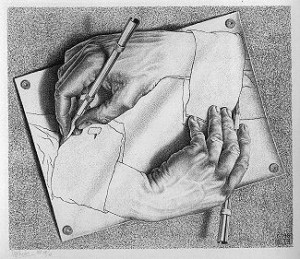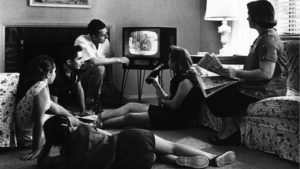 Benjamin Britten talks to Henry Comer about his work. This interview was originally telecast by the CBC on April 11, 1968:
Benjamin Britten talks to Henry Comer about his work. This interview was originally telecast by the CBC on April 11, 1968:
(This is the latest in a series of arts-related videos that appear in this space each Monday, Wednesday, and Friday)
Terry Teachout on the arts in New York City
The death of Robert Osborne, who’d served as Turner Classic Movies’ genial host since the network first started broadcasting in 1994, was announced yesterday morning, immediately followed by an outpouring of sorrow in the social media. Small wonder: Osborne, an actor turned journalist and film historian, was so ubiquitous a presence on the network that you felt as though you knew him. In addition, he had, like Roger Ebert, a knack for making the films he introduced sound irresistibly appealing. What he didn’t know about Hollywood wasn’t knowable.
 TCM, like Osborne himself, has played a central, irreplaceable role in the lives of American film lovers. As I wrote in The Wall Street Journal when the network celebrated its twentieth birthday:
TCM, like Osborne himself, has played a central, irreplaceable role in the lives of American film lovers. As I wrote in The Wall Street Journal when the network celebrated its twentieth birthday:
TCM is a basic-cable channel owned by the Turner Broadcasting System that shows old movies, most of them released prior to 1970, around the clock. Some are familiar, others obscure, but all are uncut, uncolorized, uninterrupted by commercials and otherwise unaltered. No other enterprise has done more to make such films widely accessible to the general public.
What makes TCM so noteworthy is the quality of the films that it telecasts. On Monday it will be showing, among other things, “The Adventures of Robin Hood,” “Casablanca,” “Citizen Kane,” “Gaslight,” “Gone With the Wind,” “It Happened One Night,” “The Maltese Falcon” and “Singin’ in the Rain.” You couldn’t ask for a more representative sampling of the best of studio-era Hollywood. Nor do its programmers restrict themselves to hits: They dish up cult films, foreign films, silent films, short subjects and pretty much every other kind of movie. Whether your brow is low, medium or high, TCM shows films you’ll want to see.
What made TCM more than a novelty was the coming of the programmable DVR, which makes it easy to harvest its offerings for consumption at a more convenient hour. I doubt I’m the only viewer who routinely flicks through the coming month’s fare and earmarks a half-dozen films at a time for future recording.
TCM, in short, transformed the way in which most of us experience classic films, so much so that we now take it for granted. The death of Robert Osborne serves as a reminder that we shouldn’t.
Osborne, who was eighty-four, disappeared without explanation from the small screen several months ago, and given the fact that he had suffered from poor health in recent years, it was pretty generally taken for granted, by myself among others, that he was dying. Even so, I was jolted when the news broke. Ben Mankiewicz, his replacement, is doing an excellent job and will, I suspect, play an important part in introducing TCM to a new generation of as-yet-unformed movie buffs. But for those of us who grew up, in a sense, with TCM, it is Robert Osborne of whom we will always think whenever we think of old movies on TV.
* * *
Robert Osborne’s Los Angeles Times obituary is here.
Ben Mankiewicz pays tribute to Osborne in the Hollywood Reporter.
 From 2007:
From 2007:
I read The Yale Book of Quotations from cover to cover. “Yeah, right,” my Wall Street Journal editor said when he ran across that claim in the first draft of my column, to which I replied firmly that I’d turned every damn page. Granted, I was sick as a dog that week and didn’t feel up to reading anything that required consecutive thought, but the fact remains that I did it, and in the process made any number of serendipitous discoveries, including the one about Mencken, that I almost certainly wouldn’t have made had I been “reading” The Yale Book of Quotations on a CD-ROM.
Therein lies the one great advantage of old-fashioned books: they lend themselves to browsing in a way that computerized databases do not….
Read the whole thing here.
 TV commercials rank high among the clearest and most vivid memories of my boyhood. One reason why this is so should be obvious: I saw many of them repeatedly. In many cases, they also stuck in my mind because of their deliberate, purposeful banality. (Few things are as hard to forget as a simple-minded jingle.) On occasion, though, the music for a commercial was so well-written and well-executed that it lodged forever after in my consciousness.
TV commercials rank high among the clearest and most vivid memories of my boyhood. One reason why this is so should be obvious: I saw many of them repeatedly. In many cases, they also stuck in my mind because of their deliberate, purposeful banality. (Few things are as hard to forget as a simple-minded jingle.) On occasion, though, the music for a commercial was so well-written and well-executed that it lodged forever after in my consciousness.
My untutored but sensitive ears always pricked up, for example, at Hertz Rent a Car’s “Let Hertz put you in the driver’s seat” commercials, and years later I found out why. It turns out that they were written by Richard Adler, whose other credits include the scores for Damn Yankees and The Pajama Game, and sung by the Hi-Los, the hippest of all jazz vocal groups:
No less catchy was “The Disadvantages of You,” a wordless tune with a sexy south-of-the-border beat that was used to hawk Benson & Hedges cigarettes. It was the work of Mitch Adler, who later moved over to Broadway from Madison Avenue to compose Man of La Mancha:
But those Benson & Hedges commercials, lest we forget, were also funny. Indeed, the late Sixties and early Seventies were a great time for commercials that were not infrequently funnier than the sitcoms they interrupted. For sheer looniness, it’d be hard to beat this once-ubiquitous pair of ads:
The best of them were clever enough to be worthy of the talents of such legendary comedians as Bert Lahr:
Many were the work of Doyle Dane Bernbach, the ad agency whose Alka-Seltzer ads, in particular this exercise in postmodernism avant la lettre, are very likely the best-remembered commercials of the period:
Doyle Dane Bernbach also put Volkswagen on the map with its print and TV ads, of which this one, created by Roy Grace, is at least as familiar to my fellow baby boomers as “Spicy Meatball,” another of Grace’s one-minute gems:
What is most striking in retrospect about DDB’s commercials is their comic sophistication. They were fully as clever as the sketch comedy of such classic variety series as Your Show of Shows and The Carol Burnett Show. Stan Freberg’s commercials, by contrast, were equally ingenious but funny in a different, zanier way:
It was Freberg who wrote and directed what was at the time the most expensive sixty-second spot ever filmed, a mini-musical starring Ann Miller that, once seen, can never be forgotten:
Watching these commercials, it’s easy to see what my mother meant when she said, as she often did, “You know, the commercials are some of the best things on TV.” So they were, and I very much wish that she were alive to watch them again on YouTube. I suspect that they would fill her with the same affectionate nostalgia—and the same delight—that they now give me a half-century after the two of us first saw them together.
 George Szell leads the Vienna Philharmonic in performances of Mozart’s Eine kleine Nachtmusik and William Walton’s Variations on a Theme by Hindemith. This concert was telecast on December 2, 1968:
George Szell leads the Vienna Philharmonic in performances of Mozart’s Eine kleine Nachtmusik and William Walton’s Variations on a Theme by Hindemith. This concert was telecast on December 2, 1968:
(This is the latest in a series of arts-related videos that appear in this space each Monday, Wednesday, and Friday)
 “Kitsch causes two tears to flow in quick succession. The first tear says: How nice to see children running on the grass! The second tear says: How nice to be moved, together with all mankind, by children running on the grass! It is the second tear that makes kitsch kitsch.”
“Kitsch causes two tears to flow in quick succession. The first tear says: How nice to see children running on the grass! The second tear says: How nice to be moved, together with all mankind, by children running on the grass! It is the second tear that makes kitsch kitsch.”
Milan Kundera, The Unbearable Lightness of Being (courtesy of Rod Dreher)
An ArtsJournal Blog